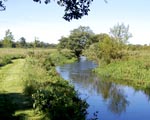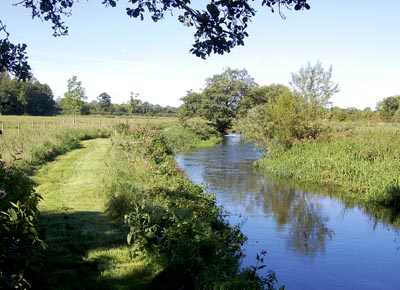Properties for sale with fishing
Only a trickle of good country houses with fishing rights come to the market every year, finds Arabella Youens


Salmon fishing hit the big screen last week with the release of the film adapt-ation of Paul Torday's novel Salmon Fishing in the Yemen. Many of the fishing scenes take place not, as the title suggests, in the Middle East, but on the River Spey, widely regarded as one of Scotland's finest. Although it might encourage a few more budding fishermen and women out to cast a fly this summer, the sport as a whole is already very popular in the UK. Thanks to investment by the Environment Agency, conservation groups and other interested parties over the past few decades, Britain's rivers have been transformed. Fish stocks have grown, as has interest in properties with riparian rights.
The challenge for someone in the market for such a property is finding one, as the supply of gold-standard fishing properties is but a trickle each year. North of the border, the must-have accessory for a keen fisherman with an eye on the big prize would be an eight-bedroom Georgian house with a three-quarters-of-a-mile beat on the River Spey or River Tweed, explains Robert McCulloch of Strutt & Parker, who specialises in the sale of fisheries (0131-226 2500). But these are rare and expensive. ‘We've got people on our list who say they're willing to wait years if necessary.' The buyer may well have a vision of retiring to this sort of property, so is prepared to be patient.
Similar-sized houses on the River Dee in Aberdeenshire also command a premium, which is often met because of the oil money coming out of Aberdeen itself. ‘In both these scenarios, the buyer will be looking to live in the house full-time,' says Mr McCulloch. ‘The other market for housing with fishing in Scotland tends to be for holiday homes on the more obscure, less accessible rivers in the Highlands.'

In the South, the equivalent top-drawer beat (or ‘stretch', as the terminology changes) would be on the magnificent chalk streams of the River Itchen and Test. ‘Of course, you can fish for trout and salmon pretty much all over the country, but when purists talk about fishing in the south of England, they really mean trout on the world-famous chalk streams,' explains Graham Waterton of Strutt & Parker's Salisbury office (01722 328741). ‘One of the reasons they're so expensive is scarcity. I'm lucky if more than one or two decent fisheries come up in the year.'
Someone on the lookout for fishing might, therefore, consider the other options available that don't involve waiting until one of these rare jewels hits the market. You can join a fishing club that owns stretches of chalk stream where someone else manages it for you, or you can join a syndicate or buy a share in a syndicate that owns a stretch. It's also possible to buy the freehold of the fishery with no land-except access to the bank. One such property has just launched on the books of Strutt & Parker and offers very good fishing. ‘It's less manicured and further away than the fashionable Test and Itchen, but it's thoroughly good value.'
Despite the hefty prices that you can charge for a rod on one of the big rivers (£500 per day on prime beats of the River Tweed, £600 per day for top-quality Test), nobody goes into owning a fishery with the idea of turning a large profit. ‘In general, if you can match your income to your outgoings, you're doing very well,' advises Mr McCulloch.
To give an approximate idea of the outgoings, a full-time ghillie on a River Tweed beat might require a cottage and vehicle and a salary of between £25,000 and £30,000. On a lesser stretch of the river, where the ghillie is a local man and works part-time, the salary would be in the region of £5,000 a year. Next, there's the annual levy to the river fishery board, which can vary from £10,000 for a beat on a major river to a few hundred on a lesser stretch. Added to this are the general costs of maintenance.
Sign up for the Country Life Newsletter
Exquisite houses, the beauty of Nature, and how to get the most from your life, straight to your inbox.
In the South, costs will, again, vary depending on whether you need to employ a river keeper, who will earn towards the top end of the ghillie salary, says Charlie Seligman of Savills (01962 841842), and how you want to stock the river. ‘The more commercial you want to be with your fishery, the more you'll need to stock it-and fish are expensive,' warns Mr Waterton.
* Subscribe to Country Life and save £40%
-
 The loos of Buckingham Palace: Country Life Quiz of the Day, April 23, 2025
The loos of Buckingham Palace: Country Life Quiz of the Day, April 23, 2025Wednesday's Quiz of the Day looks at St George, royal toilets and German alcohol laws.
By Toby Keel Published
-
 Moore Design
Moore DesignMoore Design is a boutique interior design practice with clients around the UK and overseas.
By Country Life Published
